#Acute Food Shortages
Explore tagged Tumblr posts
Text
Global Issues We Must Acknowledge In 2023
In 2022, there was a significant and sudden decrease in worldwide collaboration. The invasion of Ukraine by Russia violated the United Nations Charter and put the lives of millions in danger. It also expedited a series of interconnected global issues and cascaded one into another in food, fuel, and energy.

The pandemic caused by COVID-19 continued to wreak havoc worldwide, and fresh research revealed just how catastrophic the pandemic has been, even beyond the disastrous effects it has had on our health. The spread of false information and disinformation posed direct and immediate dangers to the well-being of communities and political institutions.
After hitting record levels in 2022, concentrations of greenhouse gases continued to grow. Additionally, scores of natural disasters, including significant floods and hurricanes, contributed to the need for humanitarian assistance. The global economic crises have nearly completely wiped out humanity by penetrating families and personal finances.
The year 2023 will mark the halfway point to the year 2030. During that time, there will be a series of important reviews to determine where we stand with ambitious global agreements on topics such as sustainable development, climate change, gender equity, financing, natural disasters, and universal health coverage, to name only a few.
To make the most of the chance, we must conduct an open and honest evaluation of our current situation. However, when taken as a whole, these reviews will present an opportunity to build political momentum, make bold new commitments, and form inclusive coalitions.
Top 5 Global Issues To Consider In 2023
#1 Worsening Climate Crisis
Worsening climate crises is one of the major global issues of the world. At COP 27 in Sharm el-Sheikh, Egypt, new finance mechanisms, including a “loss and damage” facility for countries currently suffering from climate change, were agreed upon, advancing climate justice. In 2022, this and the Secretary-Early General’s Warnings for All project addressed climate change’s disproportionate impact on developing nations.
Despite conflicts between developed and developing nations, countries at COP 15 on biodiversity resolved to safeguard at least 30% of the world’s lands, inland waters, coastal areas, and oceans by 2030. The World Meteorological Organization’s Provisional State of the Global Climate predicts rising emissions this year.
Climate adaptation must be prioritized after 2022’s natural disasters, especially Pakistan’s flooding. At COP 28, governments are anticipated to agree to a new global adaptation objective. COP 28 will conclude the first Paris Agreement Global Stocktake. Member States had until COP 28 to settle key features of the “loss and damage” facility negotiated this year.
#2 COVID-19’s After Effects
The Omicron variety caused a global COVID-19 pandemic in 2022, with over 300 million cases. The global issue of epidemic has killed 6.6 million people. COVAX, the UN-led global initiative to expedite equitable access to COVID-19 vaccinations, showed new expressions of solidarity, but vaccine access remains shamefully unequal.
72.8% of high-income and 28.9% of low-income countries had gotten at least one dosage by December 2022. COVID-19 also hurts immunization initiatives. Immunization coverage fell from 86% in 2019 to 81% in 2021. In 2022, Mpox spread to almost 80,000 cases. Policymakers, healthcare providers, and others battled health misinformation.
Countries started negotiating a new pandemic treaty this year to improve pandemic preparedness and response. Global health funding also improved this year. A Pandemic Fund helps low- and middle-income countries prepare for pandemics. In 2023, countries will negotiate a pandemic pact for May 2024.
In May, countries agreed to significantly increase the proportion of flexible and predictable financing available to the World Health Organization, and a global pledging conference for the Global Fund to Fight AIDS, TB, and Malaria raised more than $15.6 billion, the largest amount ever raised by a multilateral health fund.
#3 Controlled Global Development
Throughout the past two generations, the global GDP has quadrupled, practically every country has become richer, and more than a billion people have escaped extreme poverty. The Covid-19 outbreak, the Russia-Ukraine war, and the spike in global inflation have all contributed to a reversal of that progress that mutually reinforced one another.
As a result of the erosion of economic and political gains, billions of people will be in a more precarious position in 2023. There will be a reduction in the size of the global middle class, followed by increased political instability within nations. There is far too much riding on the outcome to go with any other option.
#4 Acute Food Shortages
According to the 2022 Global Report on Food Crises, the number of people experiencing food insecurity is at an all-time high. Acute food insecurity affected up to 193 million people worldwide in 2021, representing an increase of about 40 million individuals compared to the previous year’s total. Shortage of food is one of the major global issues throughout the world.
The causes include “economic shocks,” such as a surge in the price of food on a worldwide scale. Domestic food price inflation also skyrocketed in countries with low per capita incomes. There is little doubt that international collaboration will be tested in new ways, and the sense of urgency required to reach the deadlines set for 2030 will become even more apparent.
#5 Cyber Security Threats
The World Economic Forum’s Global Risks Report 2022 highlighted cybersecurity vulnerabilities as a potential concern. It is the increasing adoption of digital technology, partly prompted by COVID-19. The likelihood of cyberattacks occurring in several “advanced economies” has recently increased.
Attacks caused by malware and ransomware saw increases of 358% and 435%, respectively, in the year 2020. It is due to several factors, including inadequate governance and improved means of assault. Attacks on computer networks have weakened public trust. As nations increasingly rely on digitization, their cybersecurity measures must maintain pace.
Conclusion
To make the most of the chances available in 2023, it will be necessary to take a straightforward and truthful look at the areas in which the world has veered off course without allowing oneself to become disheartened by the magnitude of the problem. As the humanitarian, health, and climatic crises continue to worsen, global leaders will have to choose solidarity.
Governments must take action for people and the earth in ways that have never been done before. The globe will continue to struggle with the widespread ramifications of Russia’s invasion of Ukraine and COVID-19’s long tail in 2023, and these crises will impact the whole world. In this regard, 2022 has established several solid bases.
#Controlled Global Development#Cyber Security Threats#Acute Food Shortages#COVID-19’s After Effect#Worsening Climate Crisis#global issues#Global Issues To Consider In 2023
0 notes
Text
Dear, free world: Apathy No More!
Note 1: Resharing my post from my terminated Tumblr account (@mahmoudkhalafff).
Note 2: Short-term goal of 30k for evacuation has been thankfully achieved. I am consulting with the Irish Refugee Council and Doras in Ireland regarding the procedures and requirements for issuing reunification visas once the crossing is operational and my family can evacuate for Egypt. We are a big family of many brothers and sisters who have so many children. They are scattered in different areas in the Gaza Strip including the North of Gaza where they can be very hard contact sometimes.
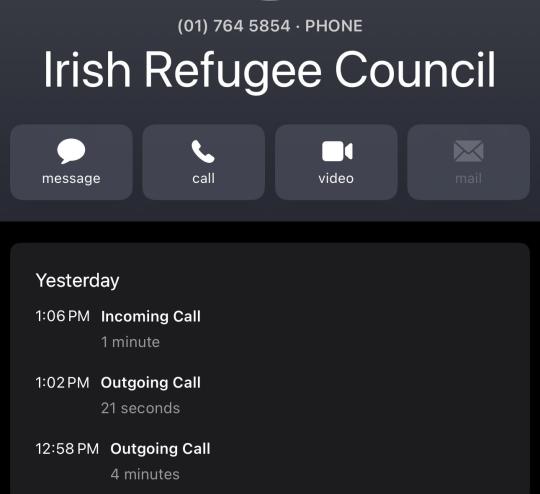

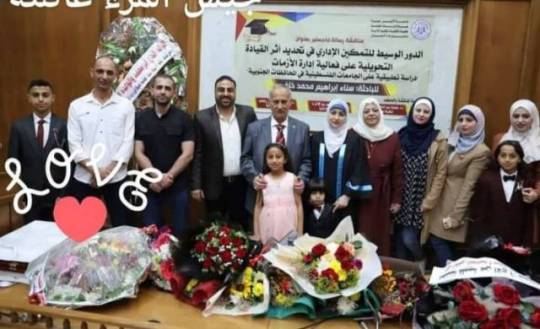
Many other Gazans in Limerick are working hard and reaching out to Irish politicians and MPs to facilitate a safe passage for their families out of Gaza to Ireland.
When piles and piles of people are apathetic when it comes to the genocide unfolding in Gaza, be the source of relief, hope, and support for the stranded helpless besieged people there. Astonishingly, our life in Gaza turned upside down in an instant?! We woke up one day to realize that a massive-scale war was to be launched against more than 2 million people in Gaza. My Facebook timeline was filled with countless posts in which Gazans publicly asked for forgiveness before their expected imminent mass murder. Can you imagine what it feels like reading all these scary posts and wondering if you should say a final 'Goodbye'?!
Then, Gazans ventured on their own version of Via Dolorosa (Way of Suffering) which included multiple forced displacements, acute life-threatening shortages of water and food, lost jobs, humiliation, mass destruction, injuries, and murder.
It is beyond shocking and sickening how desensitized our world has become to see all the horrifying images of children's body parts scattered everywhere and not lift a finger to stop this ruthless and inhumane genocide. I can say with all certitude on behalf of my people in Gaza that we have lost hope in all the vile desensitized regimes and politicians of the world.
However, we still have strong faith in the lovers and supporters of our just cause who never cease to shower us with their heartwarming words of support and uplifting wishes. Our belief in your humanity and support for our just cause drives us to ask you for help in this worst crisis in our history since the Nakba.
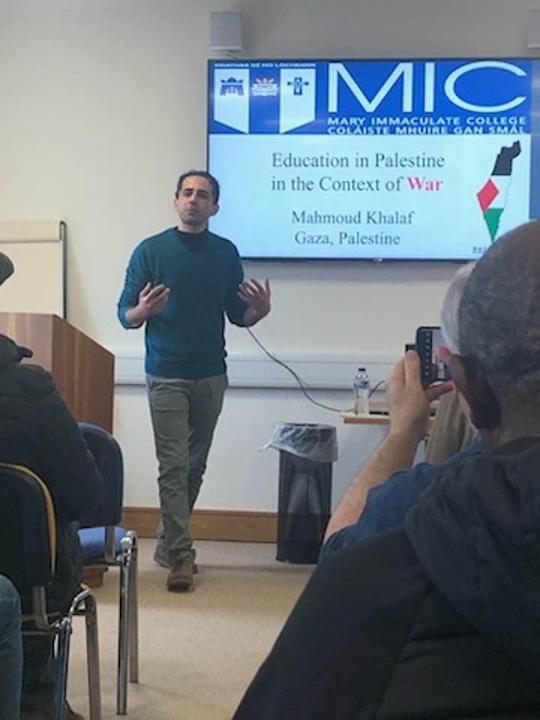
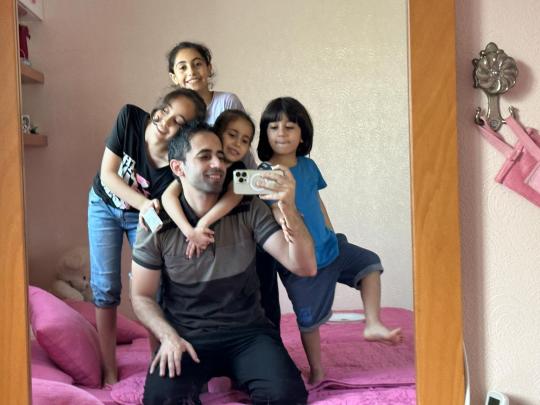
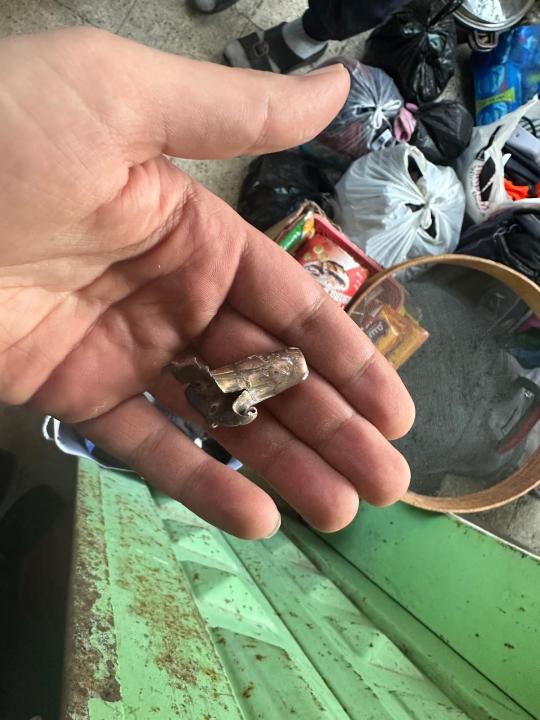
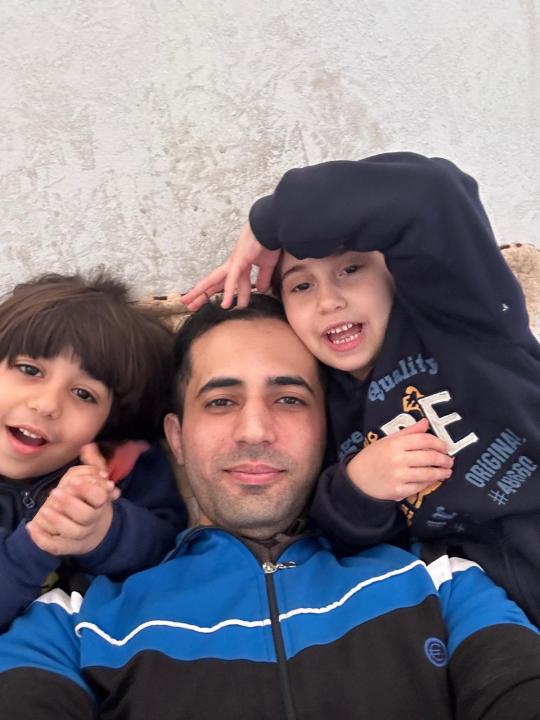
Please do consider donating, reblogging, and sharing.
Note: Vetted by:
1. @el-shab-hussein and @nabulsi # 151 on the spreadsheet of Vetted Gaza Fundraisers List]
2. @riding-with-the-wild-hunt Here .
Tagging for reach <3
@riding-with-the-wild-hunt @ibtisams @vakarians-babe @90-ghost @sayruq @fairuzfan @sar-soor @fallahifag
@el-shab-hussein @taamarrud @humanvoicebox
@plomegranate @queerstudiesnatural @commissions4aid-international @nabulsi @stil-lindigo @soon-palestine @communistchilchuck @palestinegenocide @northgazaupdates2 @northgazaupdates @ghost-and-a-half @kyra45-helping-others @kyra45 @commissions4aid-international @feluka @appsa
@tortiefrancis @jinnazah @irhabiya @mazzikah
@stuckinapril @schoolhater @queerstudiesnatural @northgazaupdates2 @turian @ot3 @fromjannah
@neechees @brutalikhoa @khanger @malcriada
@determinate-negation @pcktknife @postanagramgenerator
@troythecatfish @commissions4aid-international
#vetted#verified#mahmoud khalaf#free gaza#free palestine#gaza#gaza genocide#gaza strip#signal boost#mutual aid#palestine aid#palestine news#palestinian genocide#i stand with palestine#all eyes on palestine#!!!#ok to rb#rb#help gaza#gazaunderattack#the gaza strip#save palestine#free rafah#rafah#all eyes on rafah#save rafah#rafah under attack
2K notes
·
View notes
Text

Namibia rejects Germany’s Support of the Genocidal Intent of the Racist Israeli State against Innocent Civilians in Gaza
On Namibian soil, #Germany committed the first genocide of the 20th century in 1904-1908, in which tens of thousands of innocent Namibians died in the most inhumane and brutal conditions. The German Government is yet to fully atone for the genocide it committed on Namibian soil. Therefore, in light of Germany’s inability to draw lessons from its horrific history, President @hagegeingob expresses deep concern with the shocking decision communicated by the Government of the Federal Republic of Germany yesterday, 12 January 2024, in which it rejected the morally upright indictment brought forward by South Africa before the #InternationalCourtofJustice that Israel is committing genocide against Palestinians in #Gaza.
Worryingly, ignoring the violent deaths of over 23 000 Palestinians in Gaza and various United Nations reports disturbingly highlighting the internal displacement of 85% of civilians in Gaza amid acute shortages of food and essential services, the German Government has chosen to defend in the International Court of Justice the genocidal and gruesome acts of the Israeli Government against innocent civilians in Gaza and the Occupied Palestinian Territories.
Germany cannot morally express commitment to the United Nations Convention against genocide, including atonement for the genocide in Namibia, whilst supporting the equivalent of a holocaust and genocide in Gaza. Various international organizations, such as Human Rights Watch have chillingly concluded that Israel is committing war crimes in Gaza.
President Geingob reiterates his call made on 31 December 2023, “No peace-loving human being can ignore the carnage waged against Palestinians in Gaza”. In that vein, President Geingob appeals to the German Government to reconsider its untimely decision to intervene as a third-party in defence and support of the genocidal acts of Israel before the International Court of Justice.
977 notes
·
View notes
Text
Word List: Psychology

psychological concepts as reference for your poem/story (pt. 1)
Acute stress - Results from the sudden onset of demands or events that seem to be beyond the control of the individual. This type of stress is often experienced as tension headaches, emotional upsets, gastrointestinal disturbances, and feelings of agitation and pressure.
Barnum statements - Generalities or statements that could apply to anyone. A good example is the astrology column published in daily newspapers.
Core conditions - According to Carl Rogers, in client-centered therapy, 3 core conditions must be present in order for progress to occur: (a) an atmosphere of genuine acceptance on the part of the therapist; (b) the therapist must express unconditional positive regard for the client; and (c) the client must feel that the therapist understands him or her (empathic understanding).
Daily hassles - The major sources of stress in most people’s lives. Although minor, daily hassles can be chronic and repetitive, such as having too much to do all the time, having to fight the crowds while shopping, or having to worry over money. Such daily hassles can be chronically irritating though they do not initiate the same general adaptation syndrome evoked by some major life events.
Eye-blink startle method - People typically blink their eyes when they are startled by a loud noise. Moreover, a person who is in an anxious or fearful state will blink faster and harder when startled than a person in a normal emotional state. This means that eyeblink speed when startled may be an objective physiological measure of how anxious or fearful a person is feeling. The eye-blink startle method may allow researchers to measure how anxious persons are without actually having to ask them.
Frustration - The high-arousal unpleasant subjective feeling that comes when a person is blocked from attaining an important goal. For example, a thirsty person who just lost his last bit of money in a malfunctioning soda machine would most likely feel frustration.
Global self-esteem - By far the most frequently measured component of selfesteem; defined as “the level of global regard that one has for the self as a person” (Harter, 1993, p. 88). Global self-esteem can range from highly positive to highly negative, and reflects an overall evaluation of the self at the broadest level (Kling et al., 1999). Global self-esteem is linked with many aspects of functioning and is commonly thought to be central to mental health.
Hostile forces of nature - What Darwin called any event that impedes survival. This includes food shortages, diseases, parasites, predators, and extremes of weather.
Identity foreclosure - A person does not emerge from a crisis with a firm sense of commitment to values, relationships, or career but forms an identity without exploring alternatives. An example would be young people who accept the values of their parents or their cultural or religious group without question.
Inhibitory control - Ability to control inappropriate responses or behaviors.
Source ⚜ More: On Psychology ⚜ Word Lists ⚜ Notes & References
#writing notes#psychology#character development#writeblr#dark academia#spilled ink#literature#writers on tumblr#writing reference#writing prompt#poets on tumblr#poetry#fiction#creative writing#novel#lit#light academia#writing ideas#writing inspiration#character building#sophie gengembre anderson#writing resources
114 notes
·
View notes
Text

(Quds) ActionAid, an international humanitarian organization, has reported that citizens in Gaza are facing an extreme struggle to survive, with many now surviving on less than a single loaf of bread per day. The acute food shortage has forced both bakeries and community kitchens to close their doors.
In a statement released on Saturday, the organization said many families rely on community kitchens as their last hope for a single meal each day. However, several of these kitchens have been forced to shut down, leaving people without any source of food.
#palestine#free palestine#gaza#free gaza#current events#jerusalem#yemen#israel#tel aviv#palestine news
43 notes
·
View notes
Text
We are still far away from the goal. The amount raised can not cover the basic things of my home in light of the excessively high prices and acute shortage of food and groceries. Help us as much as you afford, your really count.



30 notes
·
View notes
Text
🗣️ BOMBING AND STARVING PREGNANT WOMEN & CHILDREN IS A WAR CRIME



Charity worried about impact of food and water shortages on women and newborns in Gaza
Women in Gaza are struggling to produce the milk they need to breastfeed their babies and keep them alive, ActionAid has said.
The charity describes food shortages in the Strip as “acute” and is concerned about the impact on the mothers of newborns.
Heba, who is currently at a UN shelter, told ActionAid the situation in Gaza is “very, very bad"”
She added: "There is no food in the supermarket, no tinned food, no food.”
“Regarding bread, we have to wait in line. We go at six in the morning and wait until the afternoon to get it.”
“This is if you even manage to get some bread, of course. Apart from that, the water we drink is not suitable for human consumption.”
Sabine, who was displaced from her home and is currently sheltering in a school in southern Gaza, gave birth to her son seven days ago, ActionAid said.
She commented: “Here there is no water, there is no food, there is nothing to drink, and there is no place to shelter the child… We do not have nappies, milk, or anything.”
A number of aid lorries have been allowed through the Rafah crossing in southern Gaza, but the quantity being delivered is far less than before the conflict began.
Israel says it is concerned that Hamas will seize the supplies. (source)
#politics#palestine#gaza#israel#war crimes#israel is an apartheid state#benjamin netanyahu is a war criminal#bds#boycott divest sanction#hamas ≠ palestine#genocide#settler colonialism#settler violence#never again#never again to anyone#ceasefire
148 notes
·
View notes
Text
As the escalation of the conflict extends to its 19th day, a staggering 2.2 million people are now in urgent need of food. Prior to the hostilities, 104 trucks a day would deliver food to the besieged Gaza Strip, one truck every 14 minutes.
Despite 62 trucks of aid being allowed to enter southern Gaza via the Rafah crossing since the weekend, only 30 contained food and in some cases, not exclusively so. This amounts to just one truck every three hours and 12 minutes since Saturday.
[...]
International Humanitarian Law (IHL) strictly prohibits the use of starvation as a method of warfare and as the occupying power in Gaza, Israel is bound by IHL obligations to provide for the needs and protection of the population of Gaza. In 2018, the UN Security Council adopted resolution 2417, which unanimously condemned the use of starvation against civilians as a method of warfare and declared any denial of humanitarian access a violation of international law. Oxfam said that it is becoming painfully clear that the unfolding humanitarian situation in Gaza squarely fits the prohibition condemned in the resolution.
Clean water has now virtually run out. It’s estimated that only three litres of clean water are now available per person – the UN said that a minimum of 15 litres a day is essential for people in the most acute humanitarian emergencies as a bare minimum. Bottled water stocks are running low and the cost of bottled water has already surged beyond the reach of an average Gaza family, with prices spiking fivefold in some places. A spokesperson for the UN Agency for Palestinian Refugees (UNWRA) pointed out that some of the food aid allowed in - rice and lentils - is useless, because people do not have clean water or fuel to prepare them.
A series of airstrikes have left several bakeries and supermarkets either destroyed or damaged. Those that are still functional, can’t meet the local demand for fresh bread and are at risk of shutting down due to the shortage of essentials like flour and fuel. Gaza’s only operative wheat mill is redundant due to the power outages. The Palestinian Water Authority says Gaza's water production is now a mere 5 percent of its normal total, which is expected to reduce further, unless water and sanitation facilities are provided with electricity or fuel to resume its activity.
Notably, essential food items, like flour, oil and sugar, are still stocked in warehouses that haven’t been destroyed. But as many of them are located in Gaza city, it is proving physically impossible to deliver items due to the lack of fuel, damaged roads and risks from airstrikes.
The electricity blackout has also disrupted food supplies by affecting refrigeration, crop irrigation, and crop incubation devices. Over 15,000 farmers have lost their crop production and 10,000 livestock breeders have little access to fodder, with many having lost their animals. Oxfam said that the siege, combined with the airstrikes, has crippled the fishing industry with hundreds of people who rely on fishing losing access to the sea.
210 notes
·
View notes
Note
Hello,
We are currently suffering from a severe shortage of food supplies and a spike in prices due to the war and the closure of crossings from both the Israeli and Egyptian sides. We can’t afford to buy food because of the excessively high prices. Please support me in rescuing my family from this acute shortage of food and the severe weight loss affecting my family🚨😍
https://www.gofundme.com/f/help-me-my-family-and-my-child-to-survive-from-this-war?utm_source=copy_link&utm_medium=customer&utm_campaign=man_sharesheet_ft
.
#gaza strip#gaza#genocide#gaza under siege#the gaza strip#free gaza#gaza genocide#gazaunderattack#please help#palestin#palestine news#palestinian art#viva palestina#free palestine#save palestine#palestinian genocide#i stand with palestine#all eyes on palestine#support palestine#pray for palestine#help palestine#palestine fundraiser#gaza gofundme#vetted gofundme#palestine gofundme#gofund me#gofundme#vetted campaign#vetted fundraisers#vetted
24 notes
·
View notes
Text

A New Future in Urban Farming in NIgeria
The severity of this problem is felt most acutely in cities, but the solution could lie within them too. Ebenezer Howard, in his 1898 book To-morrow: A Peaceful Path to Real Reform (later revised and reprinted in 1902 as Garden Cities of To-morrow), proposed practical solutions to the overcrowding and industrial pollution of Victorian cities by creating self-sufficient suburban cities surrounded by agricultural lands.
Pre-colonial African towns were similarly bordered by farmlands, as people were mostly subsistence farmers. Even with the advent of urbanization, post-independence, urban and peri-urban farms were a key feature across African cities. City residents cultivated varying sizes of plots from backyard farms to appropriated cul-de-sacs and a few hectares of peri-urban farms on the edge of the city where residents grew vegetables like spinach, bell peppers, pumpkin leaves, and tomatoes. These offered a degree of self-sufficiency for most cities. Sadly, all of these have been lost to the mindless urbanization that has characterized the last half-century.
No city in Nigeria has integrated food systems into their urban fabric, yet the growing population, security, climatic, and economic challenges necessitate a new way of thinking to mitigate the effects of climate change and its impact on food production. Urban farming offers us a lifeline. There is the potential for big cities such as Abuja and Lagos to produce a quarter of their vegetable needs, which would bolster food security, cut prices, and reduce carbon emissions. Growing food within the cities eliminates the expensive, cumbersome and carbon-intensive logistics, while also offering organic food to residents. These initiatives will also create jobs, improve nutrition for the local population, and improve the overall quality of life for residents.
22 notes
·
View notes
Text

At least 35,000 people have been killed by Israel in its war on Palestine's Gaza since last October.
Seventy percent of them have been babies, children and women, according to the Palestinian Ministry of Health.
Many thousands of others are still missing, presumed to be dead under the rubble of Gaza.
According to the United Nations, Israel's ongoing bombardment of Gaza has internally displaced 85% of the territory's population. The enclave is also suffering from acute shortages of food, clean water and medicine a direct result of Israel's crippling blockade on the besieged territory - with 60% of Gaza's infrastructure damaged or destroyed.
Israel stands accused of genocide at the International Court of Justice. An interim ruling in January ordered Tel Aviv to stop genocidal acts and take measures to guarantee that humanitarian assistance is provided to civilians in Gaza.
Source -TRTWorld
#allah#allahswt#islamdaily#islam#islamic#welcome to islam#holy quran#quran#allahuakbar#quran kareem#justice for palestinians#palestinian genocide#palestine#gazaunderfire#help gaza#free gaza#gaza strip#gaza#gaza genocide#gazaunderattack#rafah genocide#gaza under genocide#genocide#shifa ameen#rafah under attack#save rafah#free rafah#rafah
51 notes
·
View notes
Text
Seven-year-old Omar resorted to eating grass due to food shortage in Gaza, resulting in his hospitalisation due to severe pain. A video shared by Unicef shows the Palestinian boy receiving treatment for malnutrition. Unicef spokesperson Tess Ingram also added that Omar is one of many children undergoing treatment at Al-Aqsa Hospital for malnutrition.
UN agency for Palestinian refugees (Unwra) reported that one of three children under two in northern Gazais acutely malnourished.
Last month, Unicef stated that over 13,000 children have been killed by Israel as a result of its ongoing war on Gaza, with at least 23 succumbing to malnutrition. Israel faces accusations of employing starvation as weapon of war.
Source
#free palestine#save palestine#palestine#gaza#palestina#free gaza#west bank#genocide#israel terrorist#israel apartheid#israel#psycopath#ceasefire now#ceasefire#boycott israel
38 notes
·
View notes
Text
"Namibia rejects Germany’s Support of the Genocidal Intent of the Racist Israeli State against Innocent Civilians in Gaza On Namibian soil, #Germany committed the first genocide of the 20th century in 1904-1908, in which tens of thousands of innocent Namibians died in the most inhumane and brutal conditions. The German Government is yet to fully atone for the genocide it committed on Namibian soil.
Therefore, in light of Germany’s inability to draw lessons from its horrific history, President @hagegeingob expresses deep concern with the shocking decision communicated by the Government of the Federal Republic of Germany yesterday, 12 January 2024, in which it rejected the morally upright indictment brought forward by South Africa before the #InternationalCourtofJustice that Israel is committing genocide against Palestinians in #Gaza. Worryingly, ignoring the violent deaths of over 23 000 Palestinians in Gaza and various United Nations reports disturbingly highlighting the internal displacement of 85% of civilians in Gaza amid acute shortages of food and essential services, the German Government has chosen to defend in the International Court of Justice the genocidal and gruesome acts of the Israeli Government against innocent civilians in Gaza and the Occupied Palestinian Territories.
Germany cannot morally express commitment to the United Nations Convention against genocide, including atonement for the genocide in Namibia, whilst supporting the equivalent of a holocaust and genocide in Gaza. Various international organizations, such as Human Rights Watch have chillingly concluded that Israel is committing war crimes in Gaza.
President Geingob reiterates his call made on 31 December 2023, “No peace-loving human being can ignore the carnage waged against Palestinians in Gaza”. In that vein, President Geingob appeals to the German Government to reconsider its untimely decision to intervene as a third-party in defence and support of the genocidal acts of Israel before the International Court of Justice."
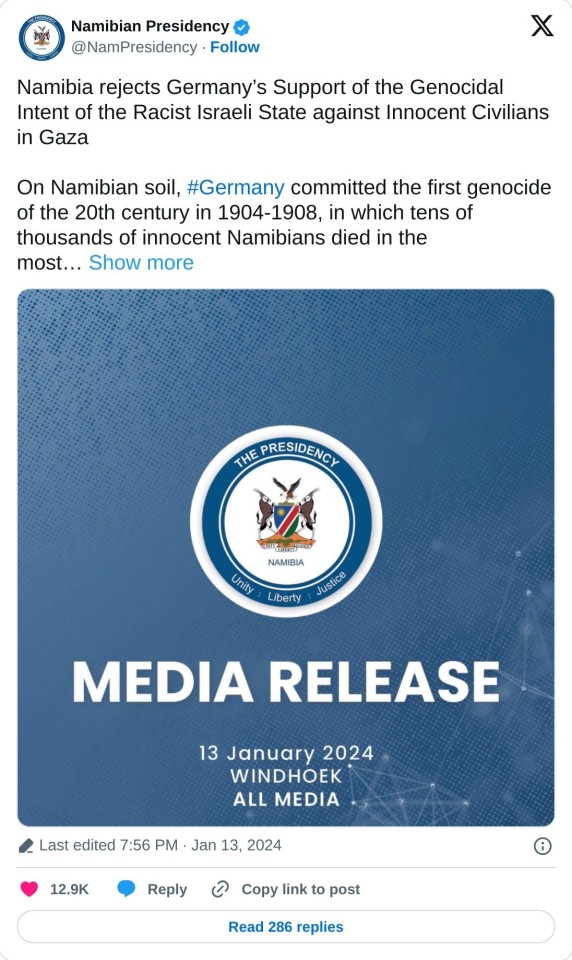
#free palestine#current events#international court of justice#germany#namibia#namibian genocide#resources#international law#human rights#free gaza#genocide convention#palestinian genocide#palestine#gazaunderattack#gazaunderfire#gaza under genocide#gaza update
81 notes
·
View notes
Text
instagram
Caption on post -
Severe food shortages have forced residents to survive on bread, with any available food sold at high prices in northern Gaza. UN aid has dwindled since lsraeli forces began expanding their war efforts on Rafah, the key entry point from Egypt.
Global pressure is mounting on lsrael as famine looms. The World Health Organization (WHO) reported that over 8,000 children under five in Gaza suffer from acute malnutrition, with 1,600 cases being severe. The Gaza health ministry said 27 children have died from malnutrition since the war started last October.
By @middleeasteye on Instagram.
Link to post.
#palestine updates#palestine news#palestine update#palestine now#gaza now#gaza news#gaza updates#gaza update#palestine#free palestine#gaza#free gaza#journalist#free palestine 🇵🇸#from the river to the sea 🇵🇸#from the river to the sea palestine will be free#end genocide#all eyes on rafah#feed north gaza#ceasefire now 🇵🇸#permanent ceasefire#ceasefire now#keep talking about palestine#keep talking about gaza#keep protesting#keep boycotting#no justice no peace#i stand with palestine 🇵🇸#free gaza 🇵🇸#current events
22 notes
·
View notes
Text
The War on Gaza: 332 Days of Continuous Conflict ‼️
Since October 7, 2023, Gaza has been engulfed in a continuous state of war, with intense military operations now entering their 332nd day. This conflict, one of the longest and deadliest in the history of clashes between Israel and Palestinian factions, has brought immense human suffering and environmental and economic disasters, affecting all aspects of life in the besieged enclave.
Humanitarian Situation
As military operations persist, the humanitarian situation in Gaza has deteriorated sharply. The population of the enclave is living under a tight blockade, leading to severe shortages of food, medicine, and fuel. Health facilities are barely functioning amidst a rising number of injuries and casualties.
Children, women, and the elderly have been the most affected by this prolonged war, with poverty and unemployment rates reaching unprecedented levels. Additionally, the population suffers from acute shortages of clean drinking water and electricity, exacerbating their daily hardships.
International Stance
Despite widespread international condemnation and repeated offers of mediation to halt the fighting, diplomatic efforts have so far made no tangible progress. The parties continue to exchange accusations of thwarting peace efforts, while countries like Egypt, Qatar, and Turkey persist in attempts to broker a long-term ceasefire.
War’s Impact
Economically, Gaza is facing near-total collapse in its infrastructure. Thousands of homes and vital facilities, including schools and hospitals, have been destroyed, making reconstruction a massive challenge that requires extensive international efforts.
The environment in Gaza has not been spared from the war’s impact either, as agricultural lands have been polluted and destroyed, threatening the food security of the population.
Conclusion
After 332 days of relentless fighting, Gaza remains in a state of loss and uncertainty. The ongoing war casts a shadow over the entire region, foretelling long-term implications for peace and stability in the Middle East. What the Palestinian people urgently need now is an end to this war and the establishment of a lasting political solution that ends decades of conflict and suffering.
This article summarizes the current situation of the ongoing war in Gaza, highlighting the humanitarian, political, and economic aspects of this prolonged conflict.
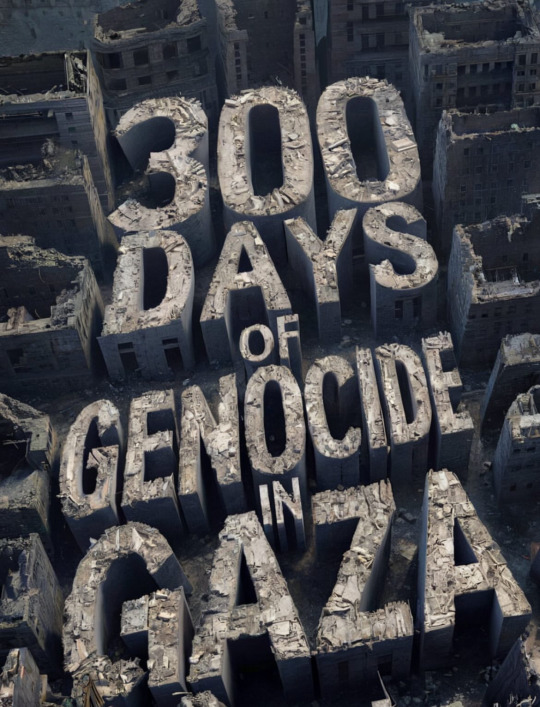
#free gaza#gazaunderattack#palestinian genocide#save palestine#free palestine#all eyes on palestine#gaza genocide#news on gaza#gaza#save gaza
17 notes
·
View notes
Text
Eric Levitz at Vox:
As of this writing, Israel’s war in Gaza has claimed the lives of more than 34,000 Palestinians, including 14,680 women, children, and elderly people, according to the United Nations. But that is just the tally of the identifiable dead. It does not include those rendered invisible or unrecognizable by rubble and fire. And that death toll could surge in the coming days and weeks. Roughly 80 percent of Gazans have been displaced from their homes, there are acute shortages of food and medical supplies, and thousands of small children are suffering from malnutrition.
Meanwhile, 121 Israeli hostages remain unaccounted for following their kidnapping by Hamas and other Palestinian militant groups on October 7. We do not know how many are already dead or what cruelties beset those still alive. We do know that Hamas fighters have subjected some of their captives to rape, according to the United Nations. On Friday, Joe Biden unveiled a plan to end these nightmares: The president has presented a roadmap to a permanent ceasefire. Broken down into three phases, the plan ostensibly aims to secure an immediate and durable end to hostilities, which would secure the release of all Israeli hostages; a surge of humanitarian relief into Gaza; the full withdrawal of Israeli troops from that territory; and international funding for Gaza’s reconstruction. Plenty of ceasefire proposals have been floated before, but two things distinguished Friday’s: According to Biden, it was the Israeli government’s own plan, and it did not explicitly call for the total destruction of Hamas as a military and governing power.
Israel’s commitment to complete victory over Hamas has been one major obstacle to peace. To this point, Hamas has proven resilient enough to withstand Israel’s onslaught and tolerant enough of Gazans’ suffering to insist on retaining power, no matter the human cost. Hamas has evinced some interest in trading hostages for Palestinian prisoners, but it has shown none in total surrender. If Israel no longer demanded the latter, then peace might be at hand. In the days since Biden’s announcement, the Israeli government has distanced itself from the ceasefire proposal and reaffirmed its commitment to Hamas’s destruction. “Israel’s conditions for ending the war have not changed: the destruction of Hamas’s military and governing capabilities, the freeing of all hostages and ensuring that Gaza no longer poses a threat to Israel,” Prime Minister Benjamin Netanyahu’s office said in a statement Saturday. This response is unsurprising. Many Israeli voters find the idea of Hamas’s ongoing military presence in Gaza to be an intolerable security risk, and this is especially true on the nation’s right. Were Netanyahu to accept the agreement, his governing coalition would likely dissolve.
Achieving peace in Gaza will therefore require a counterforce to Israel’s domestic political pressures. In recent weeks, the Biden administration threatened to freeze arms transfers to Israel if it conducted an assault on Rafah without a plan for protecting civilians in that city, where hundreds of thousands of displaced Palestinians had taken refuge. Israel proceeded to launch an airstrike that killed 45 Palestinian civilians in the city’s safe zone. If the White House wishes to turn its blueprint for peace into a reality, it may need to enforce its own red line. Such a measure would attract considerable opposition. Israel hawks in the United States insist that the Jewish state’s struggle against Hamas is existential and cannot end without that organization’s destruction. From this perspective, the death toll in Gaza is a tragic but unavoidable cost of a necessary war. World War II analogies figure prominently in this line of argument. Last week, in a column titled, “Do we still understand how wars are won?” the New York Times’s Bret Stephens accused Israel’s critics of historical amnesia.
[...]
Today, Stephens writes, Israel finds itself waging such an existential war: Hamas has called for wiping the country off the map, and the Jewish state cannot know security until it destroys its enemy’s “capability and will to wage war,” a task that entails tragedies like the one that claimed 45 civilian lives in Rafah in late May. Rather than threatening to withhold arms transfers to force Israel into appeasing Hamas, Stephens argues, the United States must “understand that [Israel has] no choice to fight except in the way we once did — back when we knew what it takes to win.” But this line of reasoning is morally and intellectually bankrupt. That we are more horrified by the mass killing of civilians today than we were in 1945 is a mark of progress, not amnesia. And in any case, Israel’s war with Hamas is not remotely analogous to the Allied cause.
By the time the United States and Great Britain began bombing Dresden and Tokyo, Nazi Germany and Imperial Japan were already in the process of mass murdering tens of millions of people. Hamas may have genocidal intentions, but it does not have genocidal capacities. Waging total war on Gaza is not necessary for averting the imminent slaughter of Israeli civilians; to the contrary, doing so risks the lives of the few Israelis whom Hamas is currently in a position to destroy. Further, the Axis powers genuinely threatened the existence of neighboring states. Hamas is incapable of defending its airspace, let alone conquering Israel. The Israeli government is right to insist that Hamas must not be allowed to launch another October 7, but that attack was only possible due to easily avoidable failures of intelligence and border defense. More fundamentally, Israel’s ends cannot justify its means in Gaza when those ends are themselves unjust. The Netanyahu government is not fighting to liberate Gazans from despotism and establish the foundations for a two-state solution. To the contrary, it is committed to Palestinian statelessness and dispossession.
The people of Gaza deserve better than Hamas, but the Israeli government has neither the capacity nor the will to give Gazans what they deserve. The best it can do for the moment is stop killing them.
[...]
But this is not the question that Israel faces today. Hamas may have genocidal aspirations. But as of now, it has scant capacity to kill Israelis outside of Gaza. And bombarding that territory’s cities has made the safe return of Israeli hostages less likely, not more so, a point that has not been lost on many of the captives’ families. In reality, Israel does not need to level Gaza in order to ensure its own existence. To prevent October 7, all the Netanyahu government needed to do was take its intelligence seriously and fortify its borders. Israeli intelligence obtained Hamas’s battle plan for October 7 more than a year in advance. Last July, an Israeli intelligence analyst warned her supervisors that Hamas had conducted a training exercise that appeared to match the intercepted battle plan. But a colonel dismissed these concerns, according to emails obtained by the New York Times. As Israeli officials conceded to the Times,“Had the military taken these warnings seriously and redirected significant reinforcements to the south, where Hamas attacked, Israel could have blunted the attacks or possibly even prevented them.”
Instead, Israel persisted in leaving the border fence with Gaza thinly defended, so as to devote more IDF troops to the protection of illegal settlements in the West Bank. The fact that Hamas’s rockets rarely succeed in killing Israelis tells us nothing about the organization’s moral character. But it does tell us something about the scale of the threat that it poses to Israel. Hamas is not a burgeoning imperial power. And it has no serious prospect of becoming one. Israel’s capacity to restrict the flow of arms and goods into Gaza places tight constraints on Hamas’s capacity to amass economic and military power.
Israel’s obsession over wanting total destruction of Hamas is hindering efforts to end the carnage in Gaza.
19 notes
·
View notes